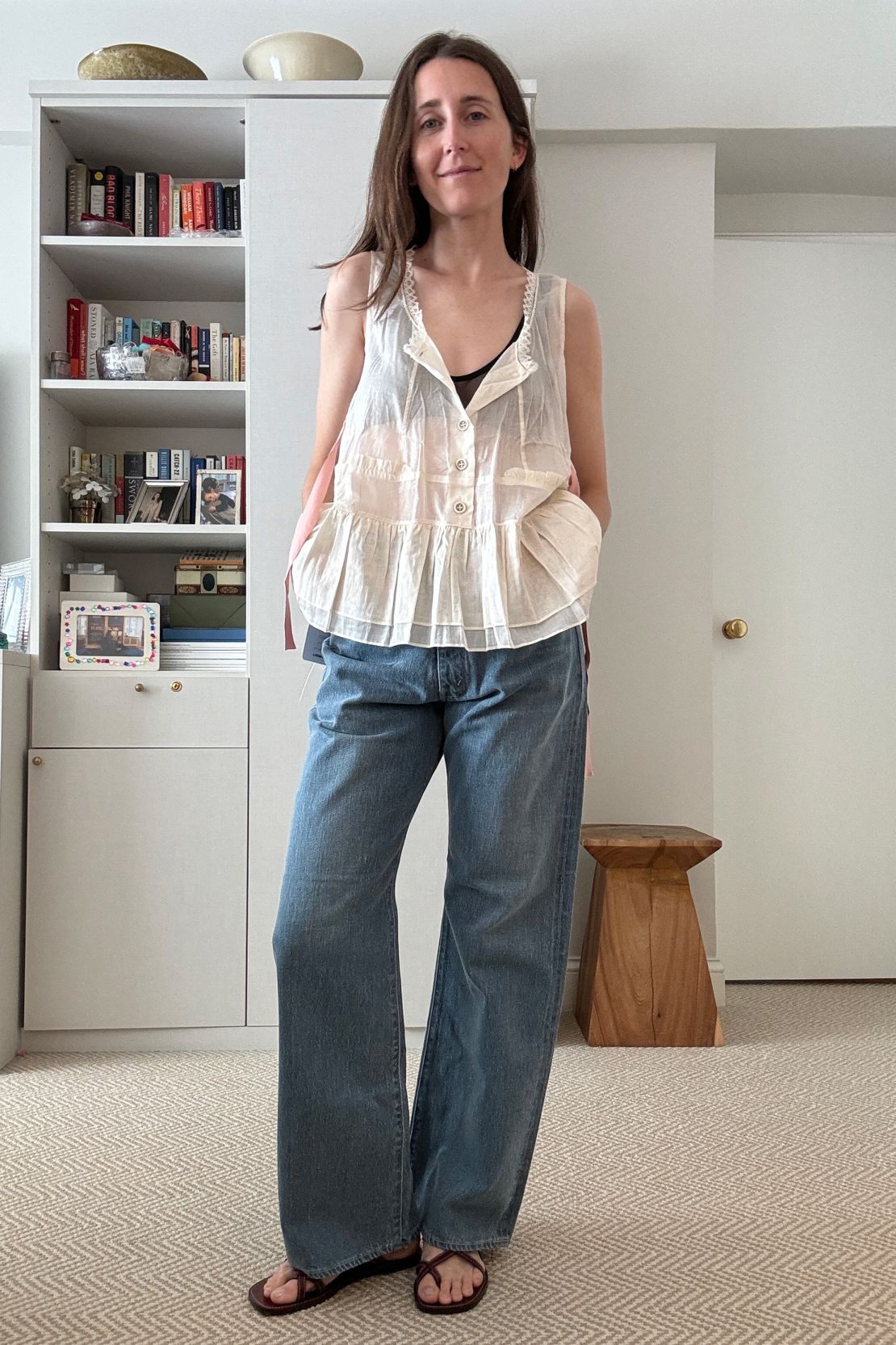When actor Blake Lively wore a pair of $19,000 designer jeans to a screening of her latest movie, “It Ends with Us,” earlier this summer, the look — covered by several media outlets — attracted plenty of attention. And the price did not go unnoticed. Of course, there were the aghast social media comments, those are to be expected, but the moment also inspired a reasonable question: How much is too much to spend on jeans?
Featuring thigh-to-heel cut-outs and hibiscus-shaped embroidery, the denim pants by Italian fashion house Valentino, were styled with a simple white tank, Christian Louboutin heels, hoop earrings and Lively’s signature long tousled hair. These jeans are something of an outlier, having been designed — undoubtedly — with celebrities and the 1% in mind. They are a conversation starter; they are about fantasy, they are not for the school drop-off.
On fashion retail websites including Net-a-Porter and Ssense, the most expensive jeans listed are nowhere near as pricey, with top figures mostly in the $2,500 to $3,500 range for brands like Jean Paul Gaultier, Dolce & Gabbana and Ralph Lauren. On Valentino’s own site at the time, the next most expensive pair was priced at $2,700 (reduced from $4,500). Still, granted, a lot of money for most people.
Cheaper options are plentiful across the market — from classic $100 Levi’s to newer denim brands, such as MUD Jeans or ELV Denim, emphasizing their sustainable or circular credentials (jeans in this category tend to be priced around $200 to $500.)
So, perhaps the real question is: With such a range in prices, and so many options, how should you decide which jeans are right for you? And what are you really getting for your money?
A brief buyer’s guide

New York-based stylist and newsletter author Becky Malinsky wearing Auralee jeans. Courtesy Becky Malinsky
Shopping for a new pair of jeans can be an overwhelming process and — from the style of cut to the wash of the denim — there are many considerations beyond price.
For stylist Becky Malinsky, it’s important to know what you are using your jeans for: “are they for work, or for hanging out with your kids, or are they for going out to dinner,” she said during a phone interview.
A simple Google search generates an overwhelming number of brands and styles to choose from. Malinsky, who also writes the popular “5 Things You Should Buy” newsletter, looks to a few “standout” denim brands to see what they are doing with shape, silhouette and color. From there, “think about where your body type fits within some of these trends,” she said.
“I always look to brands like Citizens of Humanity — I think they do a really good job of fashion and fit. I’m a classic Levi’s wearer and I recommend it to clients all the time. I think the price is right. I also look at what the designers are doing…The Row is really prolific in denim now,” she said.
When shopping, don’t just try the jeans on — stand, walk and sit in them. Comfort is essential if you plan to wear your new purchase in heavy rotation.
Malinsky also emphasized understanding how to strike a balance between style and comfort. Typically, more stretch equates to higher levels of comfort, but too much stretch will compromise shape.
“For someone who still wants a little bit of stretch in their jean I always say look for a straight leg jean or something that’s even a little bit wider. So you can get that comfort factor in your waist…but it’s not going to stretch out like a jegging.”
You may also want to consider sizing up and getting the jeans altered to your specific body shape. Whether you are tall and slim, or short and curvy, finding a good tailor can be transformative when it comes to ensuring any item of clothing is the perfect fit for you.
If you’re wondering how to judge the quality of a denim item, Malinsky said “hand feel” is very important. “Anything that’s too soft, that makes you feel like you’re practically touching a T-shirt is not going to hold up. You want to look for something that has a little resistance to your hand.”
If you’re shopping for men’s jeans, Malinsky advised against the “fake worn” look, instead suggesting a clean, and classic cut in a darker wash. She pointed to Sid Marshall as a great option in the menswear category.
Generally speaking, if you’re looking for a pair that will stand the test of time (as we should all be if we want to be more thoughtful, sustainably-minded consumers), avoid exaggerated stylings such as super-skinny or ultra-wide legs, rips and embellishments. A straight- or sightly tapered-leg, mid-to-high-rise jean in a mid- or slightly darker-toned wash will never go out of style.
The case for spending (a little) more

Featuring thigh-to-heel cut-outs and hibiscus-shaped embroidery, the denim pants by Italian fashion house Valentino, were styled with a simple white tank, Christian Louboutin heels, hoop earrings and Lively’s signature long tousled hair. Eric Charbonneau/Getty Images
While there’s no suggestion you should forgo a down payment on your first apartment for a pair of jeans, there is an argument for spending a little more.
“It takes a lot of resources, and many hands, to produce a pair of jeans,” said Sandra Capponi, co-founder of the sustainable fashion site Good on You. “So if we’re buying denim at dirt-cheap prices, then someone or something is paying the price.
“And when you take into account the cost per wear, spending money upfront on high-quality items you’ll wear again and again is often the best choice for your wallet, and for the planet,” she added.
The Good on You website includes a directory of brands, categorized by price and ethical credentials. The site currently features 21 “Great” denim brands (the highest rank, which goes from “Great” down to “We avoid.”)
“It’s incredible, the range for denim,” said Ani Wells, a spokesperson for denim industry watchdog Transformers Foundation, over Zoom. “You can find a pair for $20 and you can find a pair for $20,000. Obviously if you’re looking at a $20 pair of jeans you can imagine that the labor behind it probably wasn’t to the standards that we like to uphold if you’re thinking about the hundreds of hands that touched that pair of jeans; you can imagine that people aren’t getting paid fairly at the other end. You can also imagine that materials used are much cheaper… to get you that price.
Wells believes that $100 to $400 is the “sweet spot” for jeans. “I feel, personally, there are many sustainable brands out there that are producing a really good pair of jeans for around $150 to $200. Once you get past that $400 mark though… I believe you’re really paying for branding.”
Malinsky broadly agreed with this assessment, while echoing the warnings about how very cheap jeans are typically made.
As a consumer, is it OK to pay a premium to buy into your favorite brands? Sure. If money is no object, or you’re feeling flush, treat yourself to a pair of luxury jeans or even Lively’s Valentinos (but you’ll have to be quick, as they are already out of stock in various sizes online).
“For some people (the price of designer denim) is worth it if you’re going to be wearing this jean a ton and this is the foundation of your outfit,” said Malinsky.
Ultimately, you can’t put a price on your very own perfect pair of jeans — those you slide into multiple times a week and always make you feel great. So, shop thoughtfully, question prices under $100, try on everything and don’t worry about what other people are spending.
That said, if you’re still shaking your head at $19,000 jeans in quiet disbelief, remember: Last year, somebody bought a pair of Kurt Cobain’s beat up Levi’s for over $400,000.
— CutC by Cnn.com


